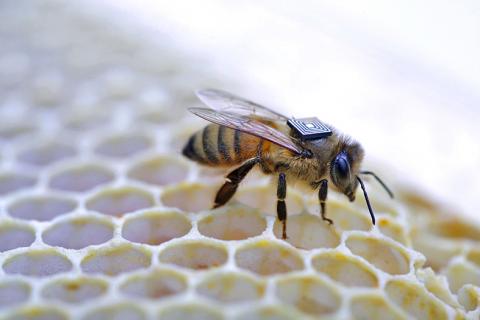Australian scientists are using microsensors attached to honey bees as part of a global push to understand the key factors driving a worldwide population decline of the pollinators.
There has been a sharp plunge in the population of honey bees, which pollinate about 70 percent of global crops, or one-third of food that humans eat, including fruits and vegetables, raising fears over food security.
Researchers have said the falling hive numbers were caused by threats such as the sudden death of millions of adult insects in beehives — known as “colony collapse disorder” — a blood-sucking mite called Varroa, pesticides and climate change.

Photo: AFP
“The microsensors that we are using help us to ask different questions that we couldn’t ask before because we’ve never really been able to quantify the behavior of bees both out in the environment and in their hives,” said Gary Fitt from Australia’s Commonwealth Scientific and Industrial Research Organisation (CSIRO).
The sensors, 2.5mm in width and breadth and weighing 5.4mg — lighter than pollen that bees collect — are glued to the back of European honey bees. Sophisticated data collection receptors are also built into hives.
CSIRO — working with US technology firm Intel and Japanese conglomerate Hitachi — is now offering free access to the sensor technology and data analytics to identify global patterns.
“What we are gathering with the sensors is environmental information from where the bees have been,” said Fitt, science director for health and science at CSIRO.
“It tells us about their changes in behavior — how often and how long they’re foraging, whether they’re feeding, whether they’re collecting pollen, what they’re doing in the hives,” he said.
“We can then see if we can interpret those changes to tell us how they are responding to different stresses,” he said.
About 10,000 bees and their hives in Tasmania have been tagged, with others set to be monitored in Sydney and Canberra.
About the same number of bees in Brazil were also being monitored by researchers, with interest expressed from scientists in Europe and North America, Fitt said.
We will “use the same approaches and ask similar questions, but in different parts of the world to get a much bigger picture of the problem and collectively find solutions,” he added.
Australia’s bee populations have not been devastated as the continent has yet to be affected by the Varroa mite.
In countries such as the US, beekeepers lost 42 percent of colonies over the 12 months to May this year — the second-worst year on record for US bee mortality, with the worst season reported in 2012-2013, the US Department of Agriculture estimated.

VAGUE: The criteria of the amnesty remain unclear, but it would cover political violence from 1999 to today, and those convicted of murder or drug trafficking would not qualify Venezuelan Acting President Delcy Rodriguez on Friday announced an amnesty bill that could lead to the release of hundreds of prisoners, including opposition leaders, journalists and human rights activists detained for political reasons. The measure had long been sought by the US-backed opposition. It is the latest concession Rodriguez has made since taking the reins of the country on Jan. 3 after the brazen seizure of then-Venezuelan president Nicolas Maduro. Rodriguez told a gathering of justices, magistrates, ministers, military brass and other government leaders that the ruling party-controlled Venezuelan National Assembly would take up the bill with urgency. Rodriguez also announced the shutdown

Civil society leaders and members of a left-wing coalition yesterday filed impeachment complaints against Philippine Vice President Sara Duterte, restarting a process sidelined by the Supreme Court last year. Both cases accuse Duterte of misusing public funds during her term as education secretary, while one revives allegations that she threatened to assassinate former ally Philippine President Ferdinand Marcos Jr. The filings come on the same day that a committee in the House of Representatives was to begin hearings into impeachment complaints against Marcos, accused of corruption tied to a spiraling scandal over bogus flood control projects. Under the constitution, an impeachment by the

Exiled Tibetans began a unique global election yesterday for a government representing a homeland many have never seen, as part of a democratic exercise voters say carries great weight. From red-robed Buddhist monks in the snowy Himalayas, to political exiles in megacities across South Asia, to refugees in Australia, Europe and North America, voting takes place in 27 countries — but not China. “Elections ... show that the struggle for Tibet’s freedom and independence continues from generation to generation,” said candidate Gyaltsen Chokye, 33, who is based in the Indian hill-town of Dharamsala, headquarters of the government-in-exile, the Central Tibetan Administration (CTA). It

A Virginia man having an affair with the family’s Brazilian au pair on Monday was found guilty of murdering his wife and another man that prosecutors say was lured to the house as a fall guy. Brendan Banfield, a former Internal Revenue Service law enforcement officer, told police he came across Joseph Ryan attacking his wife, Christine Banfield, with a knife on the morning of Feb. 24, 2023. He shot Ryan and then Juliana Magalhaes, the au pair, shot him, too, but officials argued in court that the story was too good to be true, telling jurors that Brendan Banfield set